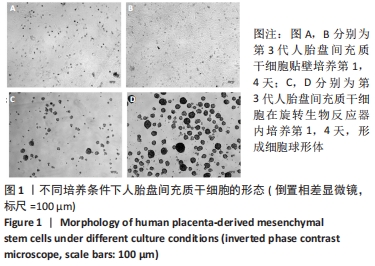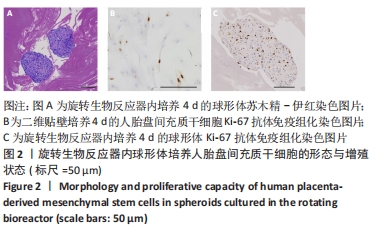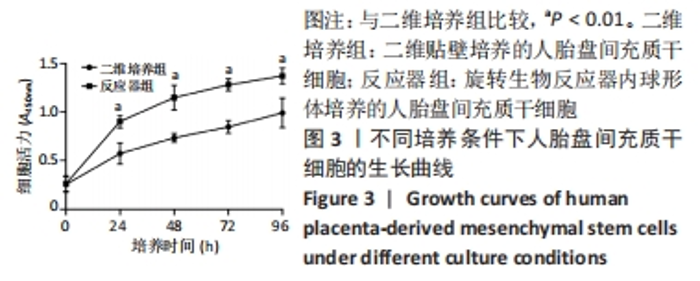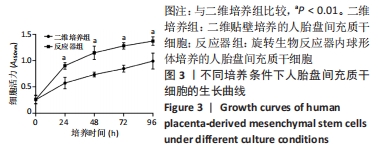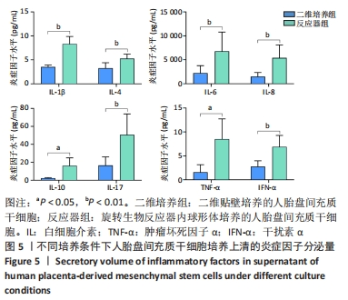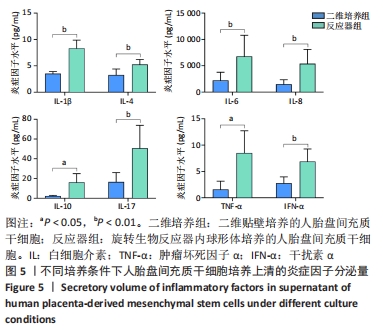Chinese Journal of Tissue Engineering Research ›› 2024, Vol. 28 ›› Issue (19): 3012-3017.doi: 10.12307/2024.177
Previous Articles Next Articles
Effects of spheroid culture in a rotating bioreactor on secretion of inflammatory factors by human placenta-derived mesenchymal stem cells
Zhang Pingping1, Liang Tingting1, Fan Mingsong2, Chen Li3, Zhang Shichang1, 4
- 1Department of Laboratory Medicine, 2Department of Obstetrics, First Affiliated Hospital of Nanjing Medical University, Nanjing 210029, Jiangsu Province, China; 3Department of Gynaecology and Obstetrics, 4Department of Clinical Laboratory Medicine, Shenzhen Hospital of Southern Medical University, Shenzhen 518110, Guangdong Province, China
-
Received:2023-05-26Accepted:2023-07-08Online:2024-07-08Published:2023-09-26 -
Contact:Zhang Shichang, MD, Chief technician, Associate professor, Master’s supervisor, Department of Laboratory Medicine, First Affiliated Hospital of Nanjing Medical University, Nanjing 210029, Jiangsu Province, China; Department of Clinical Laboratory Medicine, Shenzhen Hospital of Southern Medical University, Shenzhen 518110, Guangdong Province, China -
About author:Zhang Pingping, Master candidate, Department of Laboratory Medicine, First Affiliated Hospital of Nanjing Medical University, Nanjing 210029, Jiangsu Province, China -
Supported by:National Natural Science Foundation of China, No. 81671836 (to ZSC)
CLC Number:
Cite this article
Zhang Pingping, Liang Tingting, Fan Mingsong, Chen Li, Zhang Shichang. Effects of spheroid culture in a rotating bioreactor on secretion of inflammatory factors by human placenta-derived mesenchymal stem cells[J]. Chinese Journal of Tissue Engineering Research, 2024, 28(19): 3012-3017.
share this article
Add to citation manager EndNote|Reference Manager|ProCite|BibTeX|RefWorks
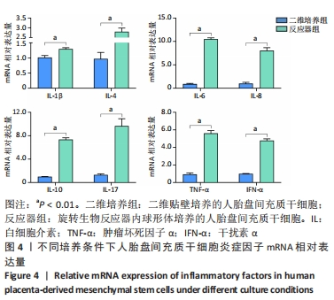
2.4 旋转生物反应器内球形体培养对人胎盘间充质干细胞炎症因子基因表达的影响 利用RT-qPCR检测旋转生物反应器内球形体培养和二维贴壁培养人胎盘间充质干细胞中炎症因子的mRNA表达,结果显示旋转生物反应器内球形体培养人胎盘间充质干细胞中IL-1β、IL-4、IL-6、IL-8、IL-10、IL-17、TNF-α和IFN-α的mRNA表达量显著高于二维贴壁培养人胎盘间充质干细胞(P < 0.01),特别是旋转生物反应器内球形体培养可将人胎盘间充质干细胞中IL-6和IL-17的mRNA表达量提高到10倍以上,IL-8、IL-10、TNF-α和 IFN-α的mRNA表达量提高到5倍以上,见图4。"
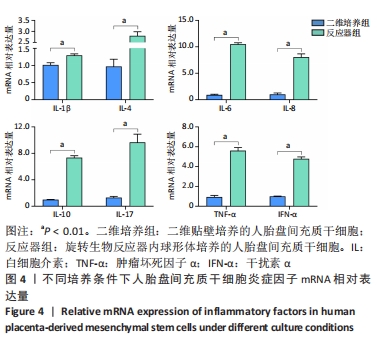
| [1] DU Y, LIANG Z, WANG S, et al. Human pluripotent stem-cell-derived islets ameliorate diabetes in non-human primates. Nat Med. 2022;28(2):272-282. [2] BORSA M, SIMON AK. Fine-tuning stemness. Science. 2020;369(6502):373-374. [3] GALIPEAU J, SENSEBE L. Mesenchymal stromal cells: clinical challenges and therapeutic opportunities. Cell Stem Cell. 2018;22(6):824-833. [4] RASOULI M, NAEIMZADEH Y, HASHEMI N, et al. Age-Related Alterations in Mesenchymal Stem Cell Function: Understanding Mechanisms and Seeking Opportunities to Bypass the Cellular Aging. Curr Stem Cell Res Ther. 2023. doi: 10.2174/1574888X18666230113144016. [5] CHEN KG, MALLON BS, MCKAY RD, et al. Human pluripotent stem cell culture: considerations for maintenance, expansion, and therapeutics. Cell Stem Cell. 2014;14(1):13-26. [6] YEN BL, HSIEH CC, HSU PJ, et al. Three-Dimensional Spheroid Culture of Human Mesenchymal Stem Cells: Offering Therapeutic Advantages and In Vitro Glimpses of the In Vivo State. Stem Cells Transl Med. 2023;12(5):235-244. [7] 梁婷婷,张世昌.间充质干细胞球形体培养的研究进展[J].中华细胞与干细胞杂志(电子版),2021,11(11):372-377. [8] QIAO Y, XU Z, YU Y, et al. Single cell derived spheres of umbilical cord mesenchymal stem cells enhance cell stemness properties, survival ability and therapeutic potential on liver failure. Biomaterials. 2020;227:119573. [9] KONG Y, MA B, LIU F, et al. Cellular stemness maintenance of human adipose-derived stem cells on ZnO nanorod arrays. Small. 2019;15(51):e1904099. [10] ZHANG S, LIU P, CHEN L, et al. The effects of spheroid formation of adipose-derived stem cells in a microgravity bioreactor on stemness properties and therapeutic potential. Biomaterials. 2015;41:15-25. [11] ZHANG S, ZHANG Y, CHEN L, et al. Efficient large-scale generation of functional hepatocytes from mouse embryonic stem cells grown in a rotating bioreactor with exogenous growth factors and hormones. Stem Cell Res Ther. 2013;4(6):145. [12] ZHANG S, CHEN L, ZHANG G, et al. Umbilical cord-matrix stem cells induce the functional restoration of vascular endothelial cells and enhance skin wound healing in diabetic mice via the polarized macrophages. Stem Cell Res Ther. 2020; 11(1):39. [13] CHEN L, ZHANG J, YANG L, et al. The effects of conditioned medium derived from mesenchymal stem cells cocultured with hepatocytes on damaged hepatocytes and acute liver failure in rats. Stem Cells Int. 2018;2018:9156560. [14] ZHANG S, CHEN L, LIU T, et al. Human umbilical cord matrix stem cells efficiently rescue acute liver failure through paracrine effects rather than hepatic differentiation. Tissue Eng Part A. 2012;18(13-14):1352-1364. [15] SILVA-CARVALHO AÉ, DA SILVA IGM, CORRÊA JR, et al. Regulatory T-Cell Enhancement, Expression of Adhesion Molecules, and Production of Anti-Inflammatory Factors Are Differentially Modulated by Spheroid-Cultured Mesenchymal Stem Cells. Int J Mol Sci. 2022;23(22):14349. [16] WANG J, WEI Q, YANG Y, et al. Small extracellular vesicles derived from four dimensional-culture of mesenchymal stem cells induce alternatively activated macrophages by upregulating IGFBP2/EGFR to attenuate inflammation in the spinal cord injury of rats. Front Bioeng Biotechnol. 2023;11:1146981. [17] BOGERS SH, BARRETT JG. Three-Dimensional Culture of Equine Bone Marrow-Derived Mesenchymal Stem Cells Enhances Anti-Inflammatory Properties in a Donor-Dependent Manner. Stem Cells Dev. 2022;31(23-24):777-786. [18] WU C, CHEN L, HUANG YZ, et al. Comparison of the Proliferation and Differentiation Potential of Human Urine-, Placenta Decidua Basalis-, and Bone Marrow-Derived Stem Cells. Stem Cells Int. 2018;2018:7131532. [19] LUAN X, LI G, WANG G, et al. Human placenta-derived mesenchymal stem cells suppress T cell proliferation and support the culture expansion of cord blood CD34⁺ cells: a comparison with human bone marrow-derived mesenchymal stem cells. Tissue Cell. 2013;45(1):32-38. [20] LEE JM, JUNG J, LEE HJ, et al. Comparison of immunomodulatory effects of placenta mesenchymal stem cells with bone marrow and adipose mesenchymal stem cells. Int Immunopharmacol. 2012;13(2):219-224. [21] SUNG HJ, HONG SC, YOO JH, et al. Stemness evaluation of mesenchymal stem cells from placentas according to developmental stage: comparison to those from adult bone marrow. J Korean Med Sci. 2010;25(10):1418-1426. [22] 梁婷婷,陈黎,范明松,等.体外诱导人胎盘来源间充质干细胞向肝细胞分化[J].中国组织工程研究,2022,26(24):3870-3874. [23] WANG Y, FANG J, LIU B, et al. Reciprocal regulation of mesenchymal stem cells and immune responses. Cell Stem Cell. 2022;29(11):1515-1530. [24] KRAMPERA M, LE BLANC K. Mesenchymal stromal cells: Putative microenvironmental modulators become cell therapy. Cell Stem Cell. 2021; 28(10):1708-1725. [25] LEE S, KIM HS, MIN BH, et al. Enhancement of anti-inflammatory and immunomodulatory effects of adipose-derived human mesenchymal stem cells by making uniform spheroid on the new nano-patterned plates. Biochem Biophys Res Commun. 2021;552:164-169. [26] EZQUERRA S, ZULETA A, ARANCIBIA R, et al. Functional Properties of Human-Derived Mesenchymal Stem Cell Spheroids: A Meta-Analysis and Systematic Review. Stem Cells Int. 2021;2021:8825332. [27] FOLLIN B, JUHL M, COHEN S, et al. Increased Paracrine Immunomodulatory Potential of Mesenchymal Stromal Cells in Three-Dimensional Culture. Tissue Eng Part B Rev. 2016;22(4):322-329. [28] GAO Y, DUAN R, LI H, et al. Single-cell analysis of immune cells on gingiva-derived mesenchymal stem cells in experimental autoimmune uveitis. iScience. 2023; 26(5):106729. [29] JIANG Y, HONG S, ZHU X, et al. IL-10 partly mediates the ability of MSC-derived extracellular vesicles to attenuate myocardial damage in experimental metabolic renovascular hypertension. Front Immunol. 2022;13:940093. [30] PENG YQ, WU ZC, XU ZB, et al. Mesenchymal stromal cells-derived small extracellular vesicles modulate DC function to suppress Th2 responses via IL-10 in patients with allergic rhinitis. Eur J Immunol. 2022;52(7):1129-1140. [31] WANG J, DING H, ZHOU J, et al. Transplantation of Mesenchymal Stem Cells Attenuates Acute Liver Failure in Mice via an Interleukin-4-dependent Switch to the M2 Macrophage Anti-inflammatory Phenotype. J Clin Transl Hepatol. 2022; 10(4):669-679. [32] LIN T, KOHNO Y, HUANG JF, et al. Preconditioned or IL4-Secreting Mesenchymal Stem Cells Enhanced Osteogenesis at Different Stages. Tissue Eng Part A. 2019; 25(15-16):1096-1103. [33] FURUHATA Y, KIKUCHI Y, TOMITA S, et al. Small spheroids of adipose-derived stem cells with time-dependent enhancement of IL-8 and VEGF-A secretion. Genes Cells. 2016;21(12):1380-1386. [34] XIE L, MAO M, ZHOU L, et al. Signal Factors Secreted by 2D and Spheroid Mesenchymal Stem Cells and by Cocultures of Mesenchymal Stem Cells Derived Microvesicles and Retinal Photoreceptor Neurons. Stem Cells Int. 2017;2017: 2730472. [35] KOMI DEA, KHOMTCHOUK K, SANTA MARIA PL. A Review of the Contribution of Mast Cells in Wound Healing: Involved Molecular and Cellular Mechanisms. Clin Rev Allergy Immunol. 2020;58(3):298-312. [36] CHENG N, KIM KH, LAU LF. Senescent hepatic stellate cells promote liver regeneration through IL-6 and ligands of CXCR2. JCI Insight. 2022;7(14):e158207. [37] CHOI J, CHOI W, JOO Y, et al. FGF2-primed 3D spheroids producing IL-8 promote therapeutic angiogenesis in murine hindlimb ischemia. NPJ Regen Med. 2021; 6(1):48. [38] LI W, LIU Q, SHI J, et al. The role of TNF-alpha in the fate regulation and functional reprogramming of mesenchymal stem cells in an inflammatory microenvironment. Front Immunol. 2023;14:1074863. [39] VEREB Z, MAZLO A, SZABO A, et al. Vessel Wall-Derived Mesenchymal Stromal Cells Share Similar Differentiation Potential and Immunomodulatory Properties with Bone Marrow-Derived Stromal Cells. Stem Cells Int. 2020;2020:8847038. [40] COLOMBINI A, LIBONATI F, CANGELOSI D, et al. Inflammatory priming with IL-1beta promotes the immunomodulatory behavior of adipose derived stem cells. Front Bioeng Biotechnol. 2022;10:1000879. [41] FERREIRA JR, TEIXEIRA GQ, NETO E, et al. IL-1beta-pre-conditioned mesenchymal stem/stromal cells’ secretome modulates the inflammatory response and aggrecan deposition in intervertebral disc. Eur Cell Mater. 2021;41:431-453. [42] LENERO C, BOWLES AC, CORREA D, et al. Characterization and response to inflammatory stimulation of human endometrial-derived mesenchymal stem/stromal cells. Cytotherapy. 2022;24(2):124-136. [43] SHIN JH, SHIN DW, NOH M. Interleukin-17A inhibits adipocyte differentiation in human mesenchymal stem cells and regulates pro-inflammatory responses in adipocytes. Biochem Pharmacol. 2009;77(12):1835-1844. |
| [1] | Wang Weiqing, Zhou Yue. Chronic inflammation regulates adipose tissue fibrosis [J]. Chinese Journal of Tissue Engineering Research, 2024, 28(8): 1307-1312. |
| [2] | Mei Jingyi, Liu Jiang, Xiao Cong, Liu Peng, Zhou Haohao, Lin Zhanyi. Proliferation and metabolic patterns of smooth muscle cells during construction of tissue-engineered blood vessels [J]. Chinese Journal of Tissue Engineering Research, 2024, 28(7): 1043-1049. |
| [3] | Ji Weixiu, Bai Yi, Wang Shuo, Zhao Yungang. Protective effect and mechanism of 3-nitro-N-methyl salicylamide on the skeletal muscle of rats with limb ischemia-reperfusion injury [J]. Chinese Journal of Tissue Engineering Research, 2024, 28(20): 3164-3169. |
| [4] | Wan Jun, Bai Yanjie, Wang Yan, Chen Shuying, Chen Limin, Xiao Yuqian, Sun Kexin. Mechanism of action and related signaling pathways of long non-coding RNAs in neuroimmuno-inflammatory response after ischemic stroke [J]. Chinese Journal of Tissue Engineering Research, 2024, 28(20): 3265-3271. |
| [5] | Xiao Ziteng, Wang Tingyu, Zhang Wenwen, Tan Fengyi, Su Haiwei, Li Siting, Wu Yahui, Zhou Yanfang, Peng Xinsheng. Exosomes and skin wound healing [J]. Chinese Journal of Tissue Engineering Research, 2024, 28(19): 3104-3110. |
| [6] | Yang Quan, He Huiyu, Wang Sifan, Lyu Shangyi, Zhou Qiqi, Han Xiangzhen. Overexpression of miR-378a promotes macrophage M2 polarization and inhibits M1 polarization [J]. Chinese Journal of Tissue Engineering Research, 2024, 28(13): 2036-2041. |
| [7] | Zhang Wei, Yu Lei, Yang Peng, Geng Dechun. Tabersonine alleviates wear particle-induced inflammatory osteolysis by inhibiting osteoclast activation [J]. Chinese Journal of Tissue Engineering Research, 2024, 28(10): 1519-1525. |
| [8] | Jiang Chunjing, Yang Chengxue, Yu Zhengwen, Zhang Jian. Molecular mechanisms of anti-inflammatory effects of metal ions [J]. Chinese Journal of Tissue Engineering Research, 2024, 28(10): 1626-1633. |
| [9] | Li Long, Li Guangdi, Shi Hao, Deng Keqi. Circular RNA as a competing endogenous RNA is involved in the regulation of osteoarthritis [J]. Chinese Journal of Tissue Engineering Research, 2023, 27(5): 751-757. |
| [10] | Li Yutong, Liu Jingshu, Li Zhen. Immunoregulatory mechanism of choline acetyltransferase/alpha 7 nicotinic acetylcholine receptor/nuclear factor-kappa B signaling pathway in the pathogenesis of rheumatoid arthritis [J]. Chinese Journal of Tissue Engineering Research, 2023, 27(35): 5596-5602. |
| [11] | Ma Suilu, He Zhijun, Liu Tao, Li Jinpeng, Li Yan, He Bo, Wei Xiaotao, Wang Weiwei. Traditional Chinese medicine regulates nuclear factor-kappa B signaling pathway against ischemia-reperfusion injury of skin flaps [J]. Chinese Journal of Tissue Engineering Research, 2023, 27(35): 5721-5726. |
| [12] | Xiong Bo, Wang Bin, Liu Jinfu, Lu Guanyu, Chen Cai, Huang Yue, Chen Lihua. Role of cuproptosis regulator in diagnosis and subtype of osteoarthritis [J]. Chinese Journal of Tissue Engineering Research, 2023, 27(34): 5530-5537. |
| [13] | Tang Li, Pan Yao, Zhu Guochen. Epidermal neural crest stem cells of hair follicles regulate the local expression of inflammatory factors after facial nerve injury [J]. Chinese Journal of Tissue Engineering Research, 2023, 27(33): 5249-5255. |
| [14] | Xie Na, Ma Run, Wang Lian, Shu Yuanhui, He Ping, Zhou Yan, Xiang Yining, Wang Yuping. Effect of formononetin on glucose oxidase-induced oxidative stress in rat hepatic stellate cells [J]. Chinese Journal of Tissue Engineering Research, 2023, 27(33): 5309-5313. |
| [15] | Zhang Huiyu, Yu Jingwen, Bai Zhenjun, Li Liang, Mu Bingtao, Zhang Jinfeng, Xie Jiawei. Triptolide protects damaged neurons by regulating microglial polarization [J]. Chinese Journal of Tissue Engineering Research, 2023, 27(33): 5342-5347. |
| Viewed | ||||||
|
Full text |
|
|||||
|
Abstract |
|
|||||

